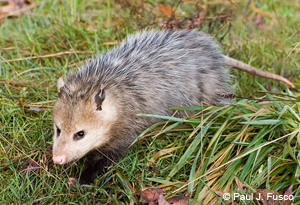Problems with Opossums
Management of Nuisance Opossums: Having an opossum in your yard should not be a problem. This non-aggressive and nondestructive animal will not dig up yards, attack or threaten pets, or dig burrows. Opossums may get into garbage or pet food that is left outside and will sometimes raid poultry yards or gardens to feed on vegetables, apples, and strawberries. However, they are more beneficial to humans than harmful because they feed on many types of insects, like crickets and beetles, as well as on mice and voles.
The best advice is to let opossums have their space and learn to live with them. However, if you really want to discourage this neighbor, there are a few measures you can take.
Eliminate or secure food attractants. Bring pet food in at night. Keep garbage covered and in a secure area (garage, shed). Pick up fallen fruit from under fruit trees. Properly maintain poultry yards and houses. Protect gardens with fencing. (All of these measures also may reduce problems with raccoons, skunks, and bears.)
Keep your yard well lit at night. Opossums prefer darkness and usually avoid well lit areas.
Eliminate hiding places. Put fencing around hiding places under decks, sheds, and other structures. Hardware cloth can be attached to the bottom of decks. The fencing should be bent outward, extending approximately two feet, then buried a few inches below the ground.
Horse owners should pay attention to the risk of opossums transmitting a serious disease to horses through fecal contamination of feed and water. The disease, known as Equine Protozoal Myeloencephalitis (EPM), is caused by a protozoal parasite whose eggs are shed in an opossum’s feces. Infected animals show various signs of illness, including symptoms of central nervous system disease. This disease also has been transmitted to other wildlife (raccoons and skunks) and domestic pets (cats). Most opossums probably are not shedding the parasite and very few of the horses exposed to the parasite will develop EPM. The disease risk can be minimized by preventing opossums from getting into domestic animal food and water through secure storage, good animal care practices, and animal-proofing of barns and other buildings.
"Problem" opossums can be harvested by a local licensed trapper during the regulated trapping season. Contact the DEEP Wildlife Division at 860-424-3011 or visit the hunting and trapping section of the DEEP website to learn about the trapping seasons.
Do you need additional help and advice concerning nuisance wildlife? Check out www.wildlifehelp.org and select "Connecticut" as your state to get started. WildlifeHelp.org is supported by the Northeast Association of Fish and Wildlife Agencies and the Northeast Wildlife Damage Management Cooperative.
Content last updated on September 13, 2018.


